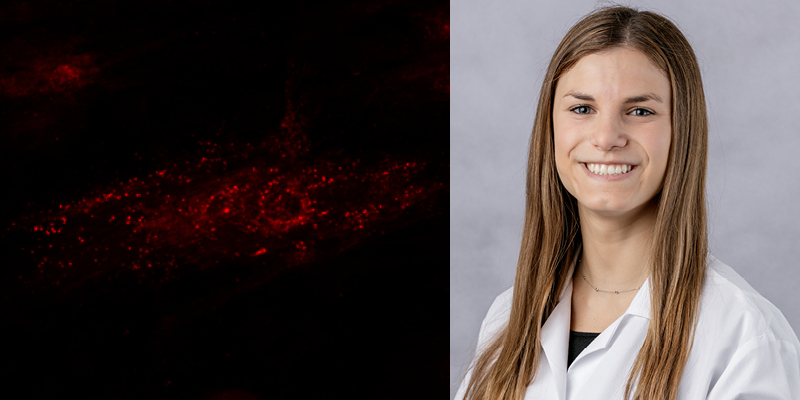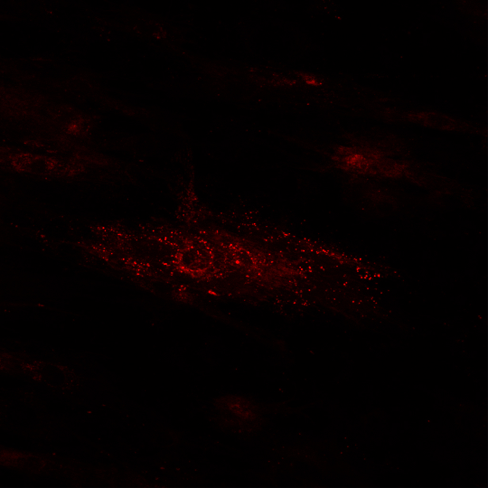
Prostate cancer is a tricky disease to treat, as it is hard to know which patients have aggressive tumors and which do not. Morgan Zenner is hoping a new test she is developing will change that.

Zenner, a MD/PhD student at the University of Illinois at Chicago, has received a Ruth L. Kirschstein National Research service F30 award from the National Cancer Institute to determine how microRNAs in extracellular vesicles circulating in the blood of prostate cancer patients can be used as a predictive test prior to making therapeutic decisions. The work is being conducted under the tutelage of Larisa Nonn, PhD, a member of the University of Illinois Cancer Center’s Cancer Biology Program and associate professor of pathology at the University of Illinois College of Medicine.
Prostate cancer is the most common cancer diagnosis and the second leading cause of cancer-related deaths among American men. Yet, many men harbor an indolent form of the disease and will die of other causes. Therefore, treating prostate cancer is challenging in that a subgroup of patients have non-life threatening disease, but it can also be lethal. Furthermore, although treatment can be curative, it is not without risk of side effects that impact quality of life.
Therefore, Zenner said, it is “essential for clinicians to accurately determine which patients will progress to lethal, metastatic cancer and which will not.”
Prostate cancer is commonly diagnosed by analyzing tissue taken by biopsy. However, because the disease often occurs as multiple tumors throughout the gland, with each growth potentially containing a different level of aggressiveness, the biopsy, Zenner said, could miss areas that contain aggressive tumors. This uncertainty has led to over-treatment of low-risk patients who choose to undergo prostate surgery.
“Surgical removal of the prostate comes with significant risks and impacts a patient’s quality of life, with the potential for urinary incontinence and erectile dysfunction,” Zenner said. “Because of this, there is an urgent clinical need for accurate prognostic testing so that clinicians can treat high-risk patients but spare low-risk patients from negative side effects.”
In addition to the extracellular microRNAs having the potential to predict how aggressive the tumor is, the vesicles have the ability to communicate between cells and have been linked to the growth and spread of tumors in the prostate and other cancers. The most common form of prostate cancer arises from the gland’s epithelial cells, which are the functional cells of the prostate, said Zenner, a graduate of the University of Illinois at Urbana-Champaign who is expected to complete her PhD next year and her medical degree in 2023.
The epithelial cells are surrounded by stromal cells, which normally function as support cells, but they stimulate the growth of the tumors in prostate cancer. The tumor-promoting stromal cells are known as cancer-associated fibroblasts.
Along with developing the microRNA test, Zenner will determine the tumor-promoting effects of extracellular vesicles released from the fibroblasts by using human prostate epithelial and stromal cells from tissue removed during radical prostatectomy surgery.
There have been many studies using microRNAs as biomarkers of prostate cancer, but Zenner’s work is unique, said Nonn.

“Morgan is using blood levels of the microRNAs to predict how aggressive the disease will be,” Nonn said. “Additionally, she is examining how microRNAs can be potential biologic contributors to the disease. To do so, she is utilizing innovative methods such as video fluorescent exosome intercellular tracking to support her findings.”
Zenner is a senior member of Nonn’s laboratory, having joined the group in the summer of 2017. She is not only an accomplished researcher, but a great teammate, Nonn said.
“Morgan never hesitates to share her expertise with new lab members and offer peer mentoring to more junior students,” Nonn said. “She is exceptionally thorough and masters the area she is researching, enabling her to form pioneering hypotheses and research directions that may have been overlooked. Her dual training as a physician also facilitates her drive to investigate clinically relevant questions. She is an outstanding collaborative researcher, working synergistically with others to complete projects as a team. Morgan has a very bright future ahead of her.”

